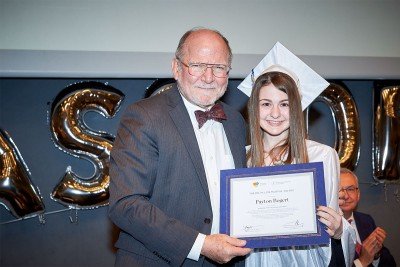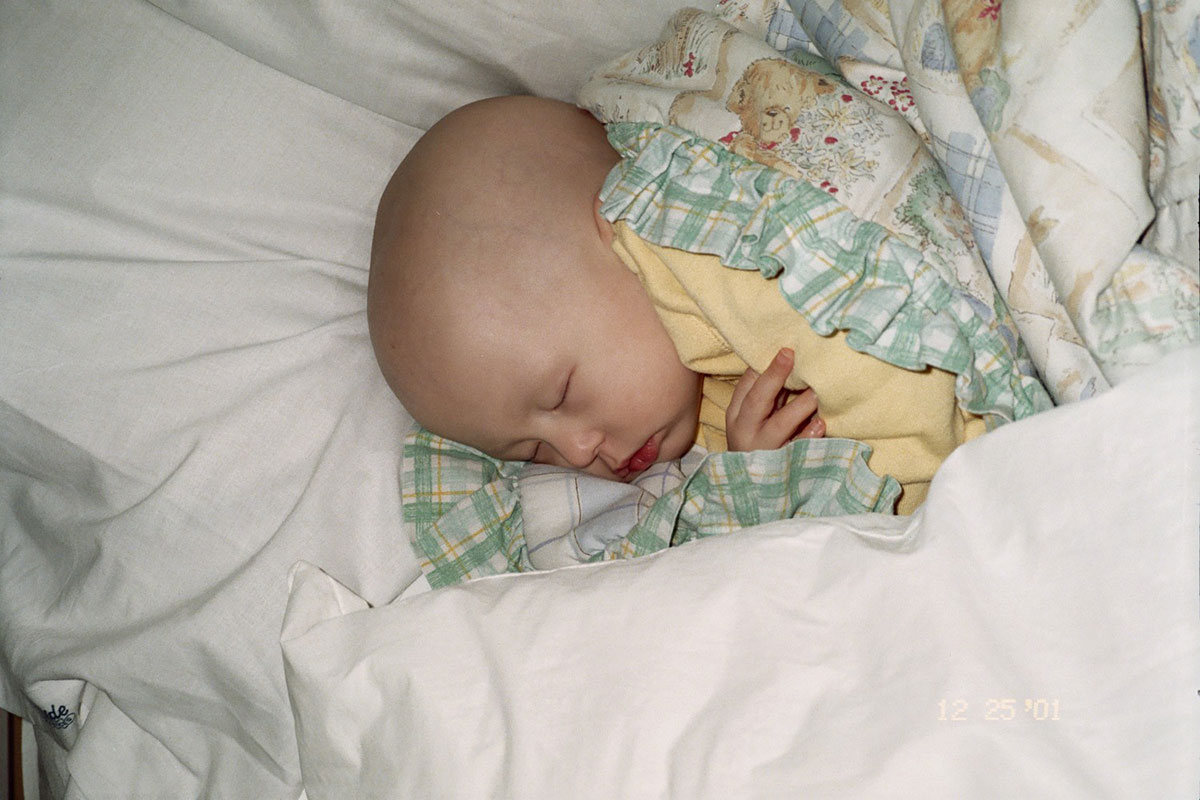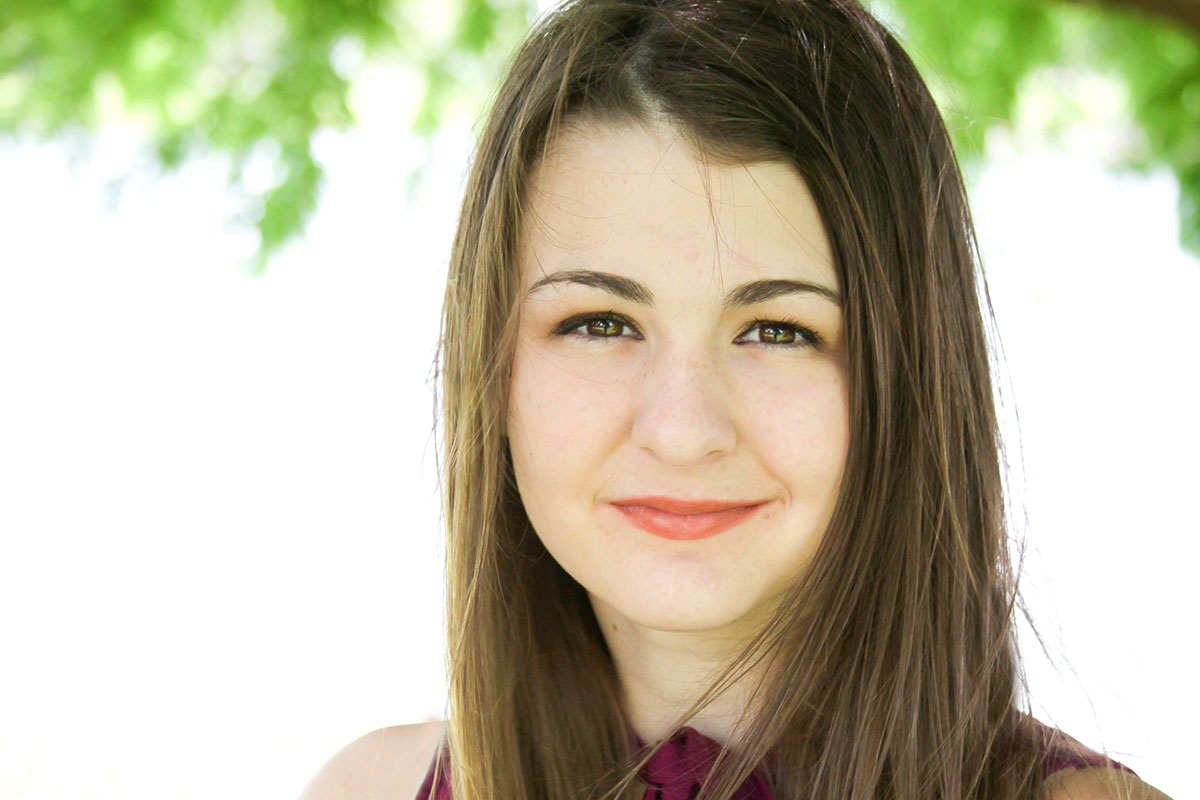Payton's Story
Payton Bogert was just 13 months old when doctors discovered she had an aggressive form of neuroblastoma. She and her family traveled from Florida for care at Memorial Sloan Kettering. Today, Payton is a star student and an advocate for young people with health challenges.

Payton, pictured with MSK pediatric oncologist Paul Meyers, received an award at convocation for her academic and community commitments.
- Payton Bogert was diagnosed with neuroblastoma as an infant.
- Her doctors in Florida urged her family to take her to Memorial Sloan Kettering for treatment.
- At MSK, Payton underwent various treatments, including immunotherapy, to knock out the disease.
- Payton graduated from high school this year and will begin college in the fall.
It was the summer of 2001, and Payton Bogert, then just 13 months old, had been fighting fevers that wouldn’t budge. The family’s pediatrician in their home state of Florida wasn’t too concerned — it was probably just a virus, he said. But Payton had other symptoms that gave her mother, Virginia, pause.
“She would drag her legs when she crawled, and one day she woke up with a black eye,” Virginia recalls.
She took Payton to another local doctor, who recommended blood work and an ultrasound. When Payton’s blood work showed abnormal findings, the doctor referred the family to an oncologist. There, after more tests, doctors found a tumor on one of Payton’s adrenal glands. She was diagnosed with neuroblastoma, a pediatric cancer that develops in the nervous system. The cancer was advanced, and the doctor said there wasn’t much he could do.
“My husband and I, our world ended that day,” Virginia says. “We didn’t just hear, ‘Your child has cancer,’ we got, ‘Your child has cancer, and it’s inoperable.’ ”
But their doctor gave them a glimmer of hope: He knew of a specialist in the type of tumor little Payton had.
“He said, ‘There is this doctor in New York, and he’s going to be her only chance,’ ” Virginia recalls. “We left for New York the next night.”
“He Made It Happen”
In early August, the family met Brian Kushner, a member of the neuroblastoma team at Memorial Sloan Kettering. Dr. Kushner had Payton scanned that afternoon and started her on chemotherapy the next day.
“He made it happen, and I will be forever grateful for that,” Virginia says. “He gave me peace of mind. For the first time, it felt like someone was finally listening to me. I felt like I was in the right place.”
Dr. Kushner has cared for hundreds of children with neuroblastoma. He felt compassion for the Bogert family when he met them.
“You love your child, and you get upset if he or she falls and hits a knee,” Dr. Kushner says. “This is a nightmare scenario, and in the old days, it was a death sentence. I’m in awe of parents who go through all of this.”

Payton underwent multiple rounds of treatment before she was just two years old.
The Bogerts moved into the Ronald McDonald House in Manhattan during Payton’s treatment. The organization provides temporary housing for people traveling to New York City for medical care. After multiple rounds of chemotherapy and surgery with pediatric surgeon Michael La Quaglia to remove as much of the tumor as possible, Payton had no evidence of disease. She moved on to maintenance therapy to keep the cancer at bay. This included radiation, a stem cell transplant, and a novel neuroblastoma antibody treatment called 3F8. MSK neuroblastoma expert Nai-Kong Cheung pioneered 3F8. It is a form of immunotherapy that works by utilizing the body’s own white blood cells to destroy cancer.
“When you inject 3F8 into the bloodstream, it circulates and attaches to neuroblastoma cells,” explains Dr. Kushner. “Once it attaches, it sends a signal to white blood cells to kill the neuroblastoma.”
In 2003, Payton finished treatment. She has had no evidence of disease ever since. Payton and her family returned to Florida but came back to New York for regular checkups with Dr. Kushner.
Continuous Care
In 2004, Payton transitioned to MSK’s Long-Term Follow-Up Clinic. This group monitors children for any late effects of cancer or cancer treatment. The clinic focuses on early detection and management of complications resulting from past therapy.
“Twenty-five years ago, we wanted to cure one child with neuroblastoma,” Dr. Kushner says. Now, with all these survivors, and because complications often arise much later in life, “we realized we needed a clinic to watch out for late effects.”
For the past eight years, Payton has seen survivorship-trained pediatrician Danielle Novetsky Friedman in the Pediatric Long-Term Follow-Up Clinic. Dr. Friedman remembers being immediately impressed with the young woman before her.
“She is an extremely happy, positive person, and she exhibited this unbelievable drive in the setting of a number of adversities,” Dr. Friedman says.
Payton, now 17, has no memory of what she endured as a little girl. She looks forward to her visits with her care team every six months.

Payton will attend the University of Florida.
“They’re more than my doctors because they’ve watched me grow up and they’re always there for support,” she says.
The cancer treatments caused Payton to lose her hearing, but that never stopped her from succeeding academically: She maintained a 4.0 grade point average in high school and took a number of advanced placement courses.
She’s also using her experiences to help others. In high school, she challenged the Florida Department of Education over standardized testing practices that did not allocate resources for hearing-impaired students. It resulted in the addition of closed captioning on state testing for all deaf and hard-of-hearing students in Florida.
“She’s a role model for kids who are in treatment,” Dr. Friedman says.
Payton and her family returned to MSK in June 2018 to take part in the Department of Pediatrics’ annual convocation. The ceremony recognizes those treated in the Department of Pediatrics who are graduating from high school that year. Virginia was able to reconnect with members of Payton’s care team during the event.
“It was a beautiful day, and I think it’s just closure,” Virginia says. “To be here and to celebrate with her nurses was just so meaningful.”
A Bright Future
In the fall, Payton will begin college at the University of Florida, where she plans to major in biology. She won a number of academic scholarships and has plans to spend her summers studying abroad in Mexico, South America, and Africa.
“Her story really blows me away,” says Dr. Kushner, who wrote Payton a college recommendation letter.
When she graduates, Payton hopes to give back by becoming a doctor at MSK.
“It would be my desire to continue the work that my doctors have started,” she says. “Even if I don’t contribute something big, if I lay down a small pebble, it could turn into something bigger.”



